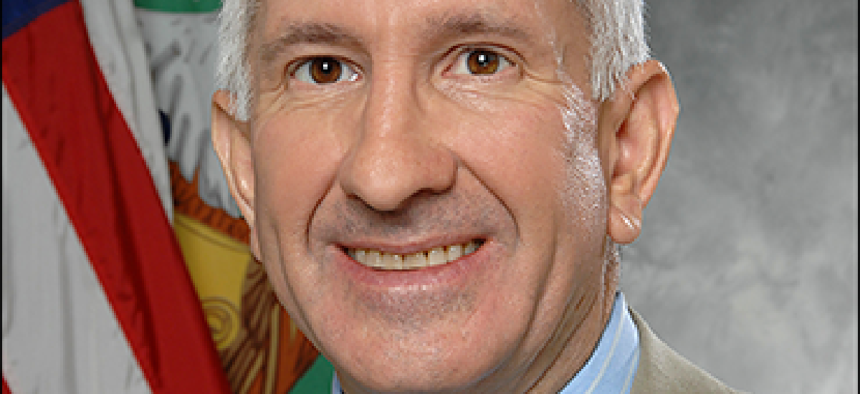New acquisition chief brings customer perspective

Thomas Sharpe, who is taking the corner office at GSA's Federal Acquisition Service, has been on the other side of the fence for years.

Thomas Sharpe, the new head of the Federal Acquisition Service, knows what it's like to be a buyer. (GSA photo)
Agencies and industry alike are watching to see what Thomas Sharpe, the newly appointed Federal Acquisition Service commissioner, brings to the General Services Administration. But some suggest that his experience in customer agencies will shape his approach and priorities.
Sharpe has held senior procurement and managerial roles with the Environmental Protection Agency, the Defense Department and most recently the Treasury Department. At Treasury, he has been responsible for department-wide procurement policy, procurement career management, and oversight and continuous improvement of bureau procurement operations.
“This is a unique qualification that’s important for running FAS,” said Roger Waldron, president of the Coalition for Government Procurement and a former senior GSA procurement official. “It’s important to understand the customer agency and industry.”
Sharpe arrives as GSA Acting Administrator Dan Tangherlini, another former Treasury executive, is laying out his agency’s mission and his priorities. Those priorities focus on the agency’s customers.
Sharpe’s “experience as an acquisition leader both in government and the private sector as well as his work representing a key customer of GSA at the Treasury Department make him uniquely qualified to help GSA better serve all of our partners,” Tangherlini said Jan. 22 in a statement announcing the new commissioner.
As FAS commissioner, Sharpe will oversee a gamut of acquisition initiatives, including customer service and strategic sourcing, and the management of more than $55 billion in product, service and solution sales to agencies.
The Multiple Award Schedules program, one of the most important in Sharpe's portfolio, is one he has criticized in the past. In 2008, while at Treasury, Sharpe said he had no confidence that GSA’s Schedule contract prices were the lowest or that the negotiated price for a product or service matched a contractor’s most-favored customer price.
“Big sales at a bad price are a big problem,” Sharpe said at the time.
Sharpe is generally a proponent of choosing the lowest price over the best value in a procurement, said Larry Allen, president of Allen Federal Business Partners. That approach is unlikely to please contactors, but fits well with the Obama administration's push for greater use of strategic sourcing, in which several buyers pool their requirements to bring prices down in exchange for larger orders. “Customer agencies are very focused on the price they’re paying for things,” Waldron said.
Sharpe is expected to “turn up the volume” on the strategic sourcing initiative, Allen said. The Office of Management and Budget gave GSA a lead role, including a leadership council. “Proponents of strategic sourcing and ‘lowest price technically acceptable’ will feel they have an ally in Tom Sharpe,” he said.
Meanwhile, best value procurements -- whereby agencies may pay a little more money for a quality product or service -- could come under suspicion, Allen said.
In recent years, FAS adjusted itself into a selling organization versus a buying one, said Bob Woods, president of Topside Consulting and a former commissioner of GSA’s now-defunct Federal Technology Service.
“By that I mean they have less functional and technical knowledge of agency mission and rely on selling products, contract vehicles and contracting staff,” he said. “I think that’s why we hear more and more emphasis on business development, sales calls and advertising.”
As commissioner, Sharpe now has more constituencies than he did as a senior procurement executive at Treasury. Allen said Sharpe is comfortable within the federal community as he works with other government leaders, even as a member of the Chief Acquisition Officers Council, and as an advocate for his department. Now though, he has to reach out to FAS’ supplier base, developing stronger relationships that were not as necessary while an SPE.
With industry, “he’s now moved from the 35-yard line to mid-field,” Allen said, predicting that Sharpe would need to spend more time on the speaking circuit and building up relationships.
As Sharpe settles into his role, Waldron said agencies and industry will have their opportunities to work together with the new commissioner to push for benefits on all sides.
“He was always willing to have a conversation and he is very open-minded,” he said.
NEXT STORY: Agencies learning to measure social media impact


